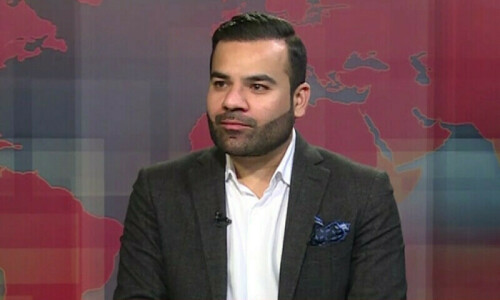AN old law is being resurrected. Why? It is a question that the government must answer.
On Friday, the law minister quietly introduced a bill in the National Assembly to give military and civil armed forces the power to ‘pre-emptively’ detain any individual facing terrorism charges for a period of up to three months. The bill, which proposes several amendments to the Anti-Terrorism Act, was quickly referred to the relevant committee by the deputy Speaker without any discussion of its salient features. It aims to resurrect several amendments to Clause 11EEEE of the ATA which had lapsed in 2016.
Specifically, the bill seeks power for the authorities to detain any individual for up to three months if they “pose a threat to national security”. The detained individual may not have actually committed a wrong: under the law, “reasonable suspicion” will be good enough for the state to deprive them of their liberty.
The rationale provided for preventive detention has long been the same: in times of insecurity, drastic measures are ‘necessary’ for maintaining order. Lately, there has been a sharp resurgence in terrorist activity, which has resulted in the loss of many lives, particularly among security personnel. As a result, there is growing pressure on security forces to restore peace in the affected areas and clamp down on militants and miscreants.
Unfortunately, Pakistan’s legal system lacks versatility and often appears inadequately equipped to deal with the various challenges faced by security forces and the state while conducting counterterrorism operations and prosecuting dangerous terrorists. For example, it has been a long-standing complaint from security forces that they catch dangerous terrorists after much effort, only to see the courts set them free again. It is in this context that legal cover is repeatedly sought for ‘emergency measures’ that violate fundamental rights.
But it is hardly as simple as that. There are countless examples of preventive detention laws being used for much more than simply combating terrorism. They have proven extremely useful, for example, for punishing political opponents and dissidents. It cannot be ignored that the language of the amendments proposed by the law minister is vague enough for the law to be used against anyone whom the state wants to put behind bars for a short period. “Reasonable suspicion” can mean anything in a country where ordinary citizens are routinely charged with terrorism merely for participating in unruly protests.
Given how frequently the ATA is used when political opponents are to be taught a lesson, any measure that enhances its potential for abuse should be a cause for alarm. It is for this reason that the government must seek political input and consensus on the changes it is seeking to make and be open about its intentions.
Published in Dawn, November 3rd, 2024














































Dear visitor, the comments section is undergoing an overhaul and will return soon.